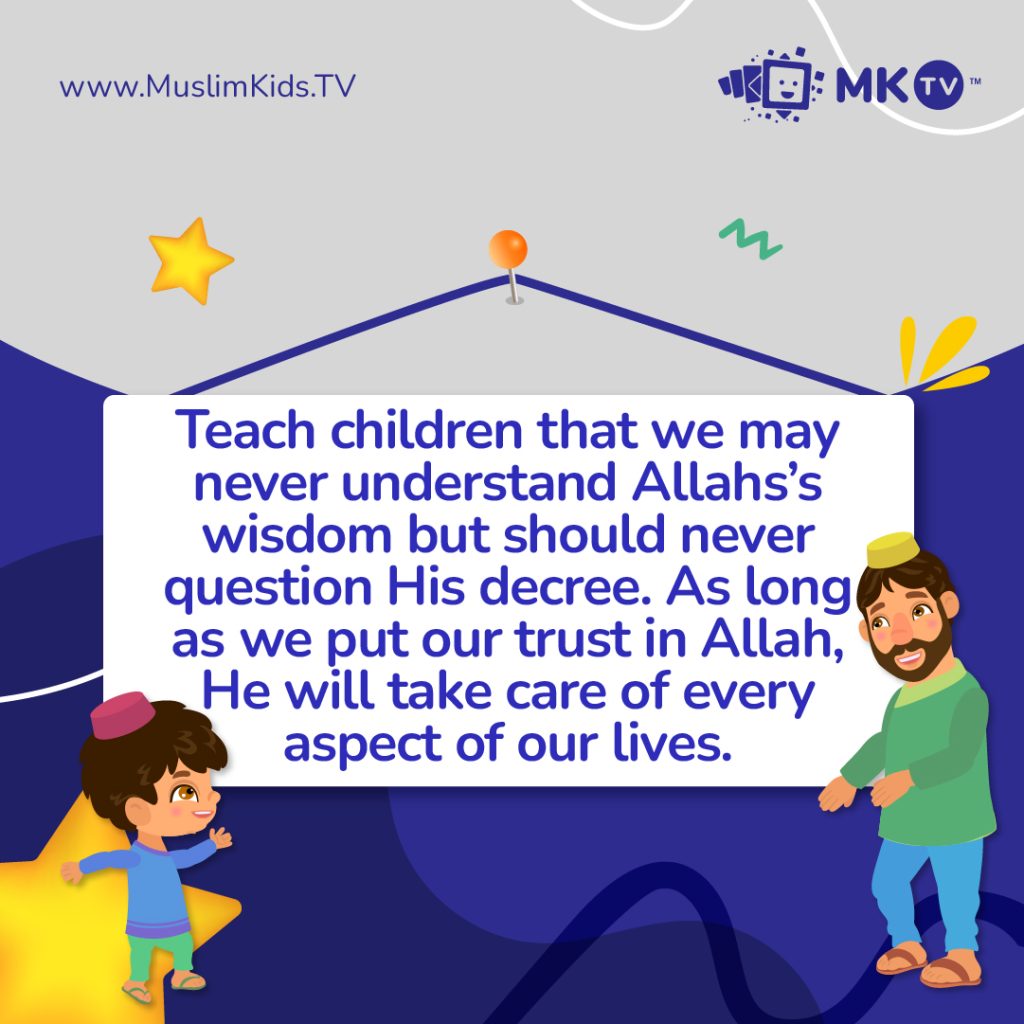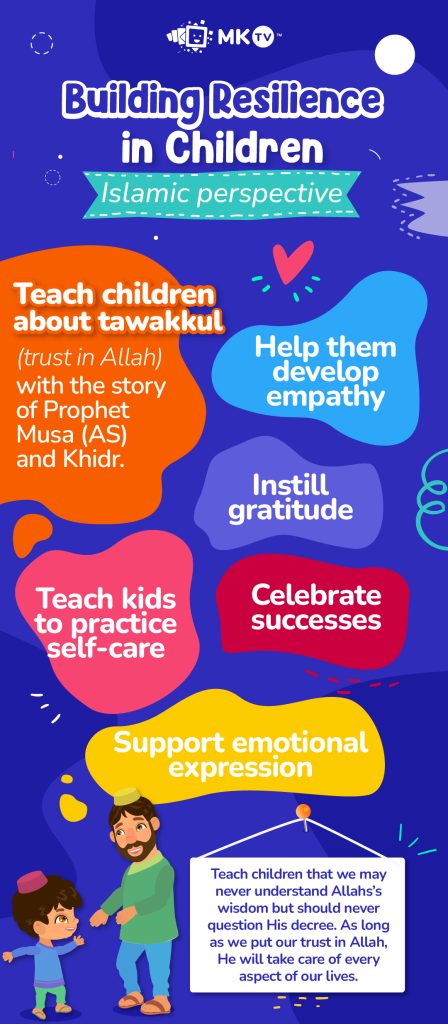Building resilience in children is an important part of teaching, and this is especially true in Muslim households. As parents and educators, it is our responsibility to equip our children with qualities they need to face difficult times in their lives. No matter how much we try to shield children from negativity and heartbreaks of the outside world, they will eventually have to deal with these harsh truths at some point of time in their lives. Helping them to cope with tragedies that’s affecting people in different parts of the world while teaching Allah’s decree and wisdom is crucial in building emotional and spiritual resilience.
Let us take a look at some tips for building resilience in children from an Islamic perspective:
Teach them about tawakkul (trust in Allah):
One of the most important qualities for a child to have is tawakkul (trust in Allah). Encourage your child to be patient and put their trust in Allah during difficult times. There might be events and tragedies that can be very hard for children to understand and grasp. They might have had to deal with the loss of a pet or see their parents get divorced, they might have seen a loved one suffer from a particular illness or watch natural or man made tragedies that snuffed out thousands of lives. Irrespective of how hard and heartbreaking things are, remind them that Allah will never abandon them and that He is in control.
Activity:
To make students understand the concept of tawakkul, introduce the story of Prophet Musa (AS) and Khidr.
When Musa (AS) was informed by Allah that there was a man named Khidr who was more knowledgeable than him, Musa (AS) wanted to meet him right away. When they met, several incidents unfolded that left Musa (AS) amazed and shocked.
Story 1 – Loss of materialistic things
When Musa (AS) and Khidr reached a seashore and saw a boat, the crew of the boat allowed them to ride in for free. However, as soon as they climbed inside, Khidr damaged the boat, shocking Musa (AS). He wondered why Khidr would damage a boat that could have potentially drowned everyone. He later learnt that Khidr knew of a wicked king who was forcefully seizing everyone’s boats. The boat he damaged belonged to the poor who depended on it for their livelihood. A damaged boat would be of no interest to the king. Khidr therefore made a small hole that would be rejected by the King, and then could be easily fixed by the poor once the king left.
From this story, teach children that they might lose something temporarily, but Allah has a better plan for them. Whether it be a lost toy or a broken gadget that they loved, children can get extremely attached to materialistic things without understanding the bigger picture ahead. This story will help them develop emotional resilience and reinforce their belief in Allah and His plans.
Story 2 – Loss of a loved one
Next, Musa (AS) and Khidr came across a boy playing with other children. Khidr killed the boy and moved on. Musa (AS) was shocked that he killed an innocent life. Musa (AS) later learnt that Khidr killed the boy to protect his parents who were pious believers. This child would have grown up to oppress, rebel and disbelieve. His parents would have followed him in his disbelief out of their love for him.

When our children come across death, whether it be on TV or in their neighborhood, in their families or hear their friends talk about a death of a loved one, they might not be able to understand the concert of the temporary nature of this world. This story will help them understand that Allah is in supreme control and whatever He does has a wisdom and bigger meaning attached to it. While it is never easy to lose a loved one, helping them understand the temporary nature of this world while teaching them that there is something everlasting and more rewarding in the hereafter will help them deal better with loss of loved ones.
Story 3 – Loss of wealth
Musa (AS) and Khidr continued their journey until they reached a town where people refused to give them food or shelter. Khidr however, noticed a wall that was about to collapse and set it straight. Musa (AS) could not understand why he helped the people in the town who refused to help him. Khidr told him that there was a treasure buried beneath the wall that was left for orphaned children. If the wall was left to collapse, the children would not have been able to retrieve the treasure.
The concept of orphans or children losing one or both parents is an extremely difficult topic to touch upon and discuss. Children would have a hard time understanding what would happen to other kids who have no parents left or why their parents were killed before them.
With this story, we can reassure our children that Allah is always looking after us and nourishing us. Just as Allah took care of the orphan boys in the story of Musa (AS) and Khidr, he will take care of everyone and provide for them from means we thought were impossible. We must never assume that we are in control. As long as we put our trust in Allah, He will take care of every aspect of our lives. Teach them that we may never understand Allahs’s wisdom but should never question His decree. He knows what we don’t.
2. Help them develop empathy:
Empathy helps build resilience because it gives us insight into different perspectives and encourages us to not take everything personally. Help the child cultivate empathy with activities like role-playing, journaling, or simply talking about feelings and experiences openly with each other.
3. Show self-care:
Teach kids to practice self-care so they can better manage stress and bounce back quickly from hard times. This could include having regular breaks away from screens, getting plenty of sleep, eating healthy meals, exercising regularly, and finding creative outlets for expressing feelings constructively.
4. Instill gratitude:
This helps foster a positive outlook on life’s hardships. By reminding children how fortunate they are for all the blessings Allah has bestowed upon them not only strengthens their faith but also helps alleviate any anxiety resulting from difficult circumstances.
5. Celebrate successes:
Make sure you recognize the child’s successes no matter how small they may be – every milestone helps build their sense of positivity and resilience! Celebrate academic achievements as well as successes such as making a new friend or overcoming a fear.
6. Support emotional expression:
Emotional expression helps us process difficult experiences so it is important that children feel supported and safe when sharing their feelings with trusted adults or peers.
Building resilience in children requires effort but it is essential for long-term well being. With these tips from an Islamic perspective, we can help our kids grow into compassionate adults who are ready to face whatever life throws at them!

